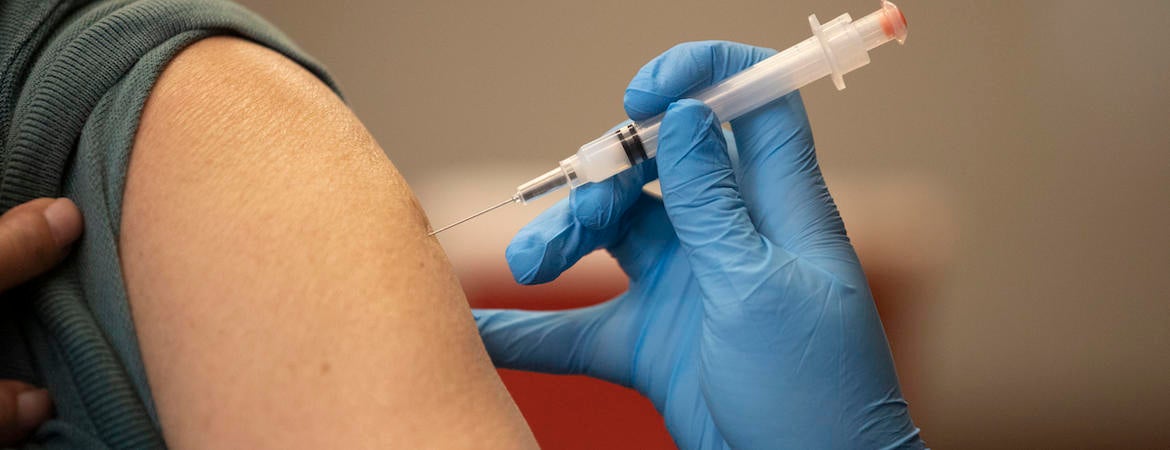
Richard Carpiano is a UC Riverside professor of public policy and sociology who specializes in public health and medical sociology, analyzing how social factors impact population health around the world. During the coronavirus pandemic, he has been quoted widely in the national media regarding nuances of vaccinating the public. Here, he weighs in on ethics related to vaccine distribution — who should decide who goes first.
Social media influencers including Nate Silver can assume the role of bioethicists, influencing public sentiment, including about vaccine distribution tiers. Do you see evidence they are having an outsized influence on vaccine priority decision-making?
No, I do not. However, the role of non-expert, social media influencers like Silver and Matt Yglesias opining on these complicated, technical matters is highly problematic from a public health communication perspective.
Expertise is essential in designing and implementing public health policy. When it comes to public health expertise, the U.S. has a bounty to draw from. ACIP and other guidelines are developed by groups of people who have the expertise, training, and experience to consider multiple factors in developing plans of action — including developing modifications if situations unfold that call for them.
By contrast, Nate Silver and other influencers like him have no expertise on such matters, and I would venture to guess that, until now, never even seriously thought about such public health issues. It is very easy for such figures to offer their opinions on what they think is the best policy or not — on this or any other public health matters that experts are thinking hard about.
In addition to the problem of their lack of expertise, their medium further complicates public understanding and confidence in public health experts. Influencers are public audience influencers — they engage with public audiences (not public health or scientific experts), so their ideas and rationales for arguing for public health to take action A vs. B are going to seem more understandable, clear, and sensible to broad public audiences like theirs. Thus, their takes have the potential to seem more reasonable to their followers than the more complex guidelines developed by actual experts and detailed in scientific reports or technical policy documents.
Public health is not perfect or all-knowing, but the field consists of our best minds for thinking up the most effective, practical, and evidence-based ways to deal with all the pandemic challenges. For public health efforts to be successful, public confidence in their expertise is critical. Thankfully, polls show that they do enjoy a high level of public trust. However, whenever non-expert influencers offer their non-expert takes on any public health responses, they risk creating unnecessary confusion and doubt among the public.
Is it ever OK to "cut in line"? In some communities, there are standby lists for unused vaccine supply. How should the “end-of-day” (surplus) vaccines be properly used?
The fact that there might be leftover doses that have limited time for use certainly adds some complexity to vaccination rollout plans.
Obviously, we want to get as many people vaccinated as possible, as quickly as possible. Standby lists are a good path forward in that they are a way to systematically deal with this issue and prevent waste.
But we have to be mindful of how standby lists are used. The most basic type of standby list might be a "first come, first served" standby list — that is, moving down a queue of names on the list. However, it is far more ideal if such standby lists are reviewed ahead of time and the people on it are prioritized based on their risk profile in terms of whichever guidelines their state is using.
Also, we need to be mindful of the means through which people are able to get on those standby lists and make the process as fair and accessible as possible. As with signing up for an appointment or showing up at vaccine sites (often with long lines, some entailing car lines), getting on such lists could present greater barriers for some individuals versus others in terms of time, resources (computer access, tech savvy, car access, assistance from a family member or caregiver), and physical abilities. Therefore, it is critical to strive to ensure fairness or equity with the use of standby lists too.
Should there be a national mandate on vaccine prioritization?
Overall, it would be difficult to institute any sort of national standard on vaccine prioritization. Public health is run at the state level and states will want to undertake or modify their plans based on "on the ground" needs.



